NCERT Solutions for Class 5 EVS Chapter 8 - A Treat for Mosquitoes
| Table of contents |

|
| Find Out |

|
| Tell |

|
| Find Out and Tell |

|
| Think |

|
| Find Out |

|
| Mosquito Check |

|
| Make a Poster |

|
| Tell |

|
| What we have Learned |

|
Find Out
Q.1. Do you know anyone who has had malaria?
Ans. Yes, one of my friends suffered from malaria at one point. It was a serious illness that affected his health significantly.
Q.2. How did they find out that they had malaria?
Ans. The presence of malaria was confirmed by examining the blood of the affected individual.
Q.3. What problems did they have with malaria?
Ans. When my friend was suffering from malaria, she experienced a high fever and became very weak.
Q.4. What other diseases can be caused by mosquito bites?
Ans. Diseases like dengue, chikungunya, filaria, etc. are caused by mosquito bites.
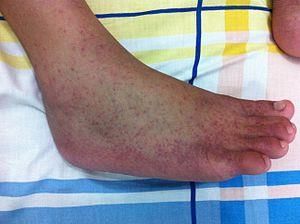
Q.5. In which season is malaria more common? Why do you think this happens?
Ans. Malaria is more common during the rainy season. This occurs because water-logged and damp areas create a suitable breeding environment for mosquitoes.
Q.6. What do you do in your house to protect yourself from mosquitoes? Also, find out from your friends about what they do.
Ans. In both my house and my friend’s house, we use mosquito repellent devices and mosquito nets to protect ourselves from mosquitoes. Additionally, we remain vigilant to ensure there is no water logging in our surroundings, as this can attract mosquitoes. We also keep our coolers, pots, and other water-holding items clean to prevent any breeding sites.
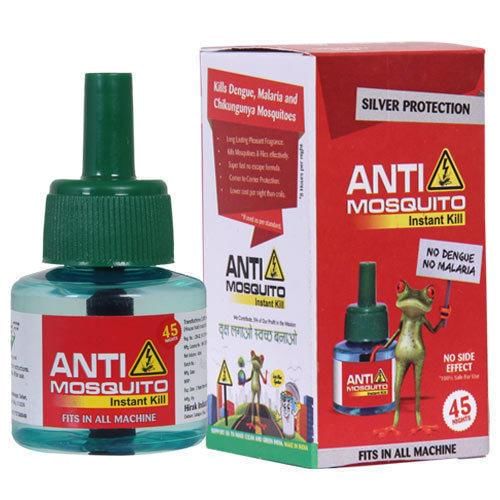
Q.7. Look at the report of the blood test given on the text page. Which words in the report help us to know that the patient has malaria?
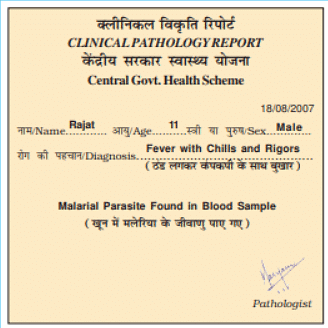
Ans. It is clearly mentioned in the report that a malarial parasite has been found in a blood sample of the patient.
Tell
Q.1. Look at Aarti’s blood report and find out the minimum haemoglobin required.
Ans. The minimum haemoglobin requirement is 12gm/dl.
Q.2. How much did Aarti’s heamoglobin go up and how long did it take for that?
Ans. Aarti’s haemoglobin increased by 2.5 gm/dl, which is approximately 30%, over a period of about three months.
Q.3. What does the newspaper report say about the problems caused by anemia?
Ans. The newspaper report states that anaemia is negatively impacting both the physical and mental health of affected children. As a result of anaemia, children do not grow properly, and their energy levels are significantly low. This condition also hampers their ability to study effectively.
Q.4 Have you or anyone in your family ever needed to get a blood test? When and why?
Ans. Yes, last year I underwent a blood test because the doctors were concerned that I might be suffering from anaemia.
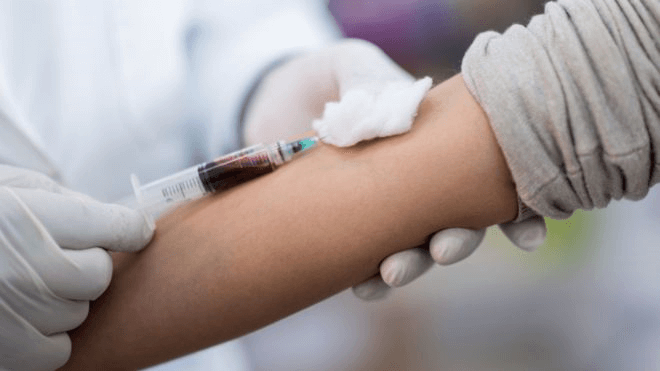
Q.5. What was found out by the blood test?
Ans. It was found that I was suffering from anaemia.
Q.6. Have you had a health check-up in your school? What did the doctor tell you?
Ans. Yes, last month we had a health check-up in our school. The doctor informed me that I was healthy.
Find Out
Q1. Ask a doctor or elders about the food items which contain iron.
Ans. When I asked the doctor about food items that contain iron, he suggested several options. According to him, green leafy vegetables such as spinach and cabbage are excellent sources of iron.
Find Out and Tell
Q.1. Have you seen any poster like this put up anywhere?
Ans. Yes, such posters are commonly put up near my school.
Q.2. Who do you think puts up such posters, or gives ads in the newspaper?
Ans. The government is likely responsible for putting up such posters and providing information in the newspaper.
Q.3. What are the same important points given in the poster?
Ans. The important points given in the poster are:
- Warning alerts regarding the diseases caused by mosquito bites.
- Fill up the pits and don’t let water stagnate around your home.
- Every corner should be kept clean and no moisture should be there so that mosquitoes don’t get to breed.
- Protect yourself from mosquitoes by using mosquito repellents.
Q.4. Why do you think pictures of a tank, cooler, and pots are shown in the poster?
Ans. Pictures of a tank, cooler, and pots are shown in the poster because these items can serve as potential breeding grounds for mosquitoes. If they become waterlogged or are not cleaned regularly, they can create an environment conducive to mosquito reproduction.
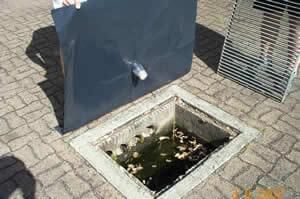
Think
Q.1. Why do you think it talks about putting fish in the tank? What do you think the fish eats?
Ans. The reason for putting fish in the tank is that they consume mosquito larvae that develop in the water.
Q.2. What will happen when oil is spread on the water?
Ans. When oil is spread on water, it can have harmful effects on the ecosystem. Specifically, it can kill the eggs and larvae of mosquitoes that are growing in that environment.
Find Out
Q.1. Which diseases are spread by flies and how?
Ans. Flies can spread several serious diseases, including dysentery, cholera, typhoid, and anthrax. They are commonly attracted to filth and often land on dirty surfaces. When flies sit on contaminated food, they can transfer harmful microbes into the food. Consequently, when people consume this food, the microbes can enter their bodies, leading to illness.
Mosquito Check
Q.1 Divide your class into two or three groups. Each group will go around to check one area in the school or around it. It must carefully note if water has collected anywhere, and mark ✓ where it finds stagnant water.

Ans. Pot, Cooler, Tang, Gutter, and Any other place- Drainage
Q.2. For how many days has the water been collected here?
Ans. Water has been collected there for approximately 8 to 10 days.
Q.3. Who is responsible for keeping these places clean?
Ans. Within the school premises, it is the responsibility of the school authority while outside the school, the local municipality is responsible for the same.
Q.4. Who is supposed to get the gutters and drains repaired?
Ans. The local municipality is responsible to get the gutters and drains repaired.

Q.5. Can any larvae be seen in the collected water?
Ans. Yes, the larvae of mosquitoes can easily be seen in the collected water.
Q.6. Has it caused any problems in the area?
Ans. Yes, it is causing many problems. The entire area is turned into a mess and breeding place of mosquitoes and germs.
Make a Poster
Q.1. In your group, make a poster with a message to keep the cooler, tank, drains, and the area clean (wherever water collects). Put up your poster in and around your school.
Ans.
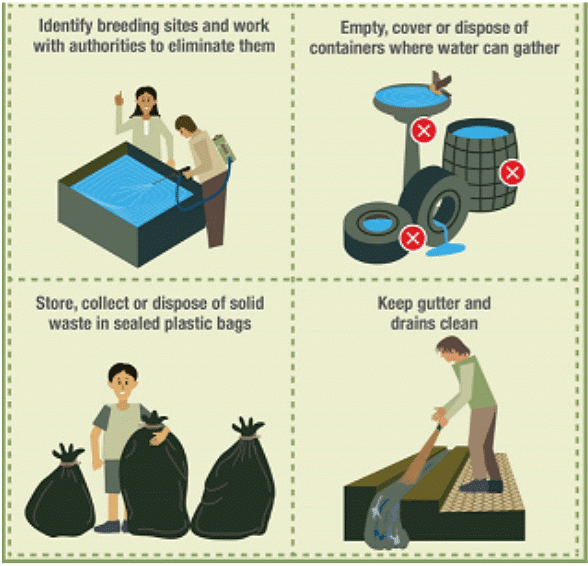
Q.2. Find out who is responsible for keeping the area around your school clean. Write a letter from your class, reporting your findings and suggestions. Find out to whom the letter should be written, and to which office it should be sent.
Ans. The local municipality is responsible for keeping the area around our school clean. So, the letter should be addressed to the Mayor and be sent to the local municipal corporation office.
Letter to the Mayor
To
The Mayor
Municipal Corporation of Delhi
New Delhi
Subject: Request for better cleanliness around Sarvodaya Vidyalaya, Rohini, Sector-8
Respected Sir,
Through this letter, we the students of Sarvodaya Vidyalaya, Rohini, Sector-8 went to bring to your notice the fifth and garbage collection around the school. The entire area has been turned into a mess and become a haven for stray dogs and germs. Last week's heavy rains have only aggravated the situation. The drains and pits are waterlogged and became the breeding ground of mosquitoes.
So, you are requested to look into the matter immediately and order to clean up garbage in the area.
Thanking you,
Your Sincerely,
Student of Class V
Sarvodaya Vidyalaya
Sector-8 Rohini
Delhi
Tell
If there is a pond or river around your house or school. Go and look around and observe these things:
Q.1.Can you see algae in or around the water?
Ans. Yes, I can see algae in or around the water.
Q.2. Where else have you seen algae?
Ans. We saw it near drains, handpumps, on damp walls, etc.
Q.3. Are their plants growing on the side or in the water? Find out their names. Draw some of these in your notebook.
Ans. Yes, there are some small plants growing around the side or in the water. These are liverworts, mosses etc.
 Fig: Worts
Fig: Worts Fig: Mosses
Fig: Mosses
Q.4. Do you think these were planted by someone or did they grow on their own?
Ans. These plants grow naturally without any external intervention.
Q.5. What else can you see in the water? Make a list.
Ans. Besides algae, small fishes, frogs, larvae, floating insects and mosquitoes are also seen.
What we have Learned
Q.1. What can you do so that mosquitoes do not breed in your house, school and neighbourhood?
Ans. To prevent mosquitoes from breeding in your house, school, and neighbourhood, consider the following measures:
- Avoid waterlogging in the surrounding areas.
- Regularly clean coolers and water tanks.
- Spray DDT and oil in drains, pits, and other stagnant water sources.
- Introduce fish in nearby ditches, pits, and ponds to control mosquito larvae.
Q.2. How can you find out if someone has malaria?
Ans. If malarial parasites are detected in a person's blood sample, it indicates that they have malaria. If no parasites are found, then the individual does not have the disease.
|
53 videos|388 docs|51 tests
|
FAQs on NCERT Solutions for Class 5 EVS Chapter 8 - A Treat for Mosquitoes
| 1. What are the main types of mosquitoes that are considered harmful to humans? |  |
| 2. How can we prevent mosquito bites effectively? |  |
| 3. What environmental factors contribute to mosquito breeding? |  |
| 4. What are some common diseases spread by mosquitoes? |  |
| 5. How can communities work together to control mosquito populations? |  |
















